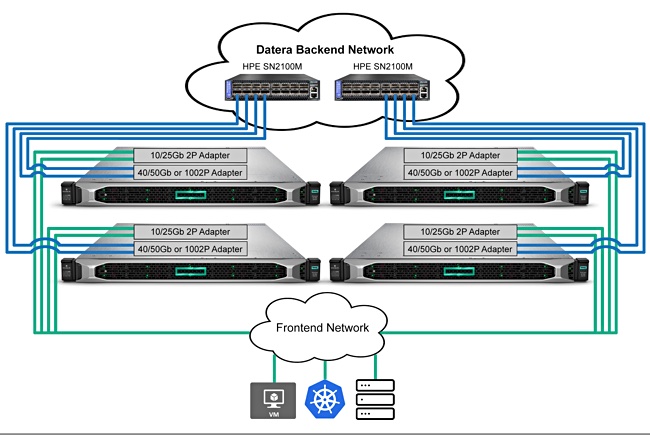HPE has assembled a server SAN for resellers that integrates its servers and networking with Datera scale-out storage software.
Startup Datera develops enterprise-class clustered block and object storage software, which it pitches as an alternative to hyperconverged infrastructure (HCI), such as Nutanix and HPE’s Simplivity. The company also markets the software as a fast and flexible alternative to traditional external SAN array storage, a category that includes HPE’s 3PAR and Primera arrays.
The HPE Datera Cloud Kit is orderable from its resellers with a single SKU and includes:
- 4 x ProLiant DL360 Gen 10 server nodes, each with 19.2TB or 38.4TB SATA SSDs
- 76.8TB or 153.6TB raw capacity
- 2 x M-Series SN2100M switches for the Datera backend network
- Datera SW subscription license
- 40/50GB or 100Gb DAC backend network cables
- Smart Fabric Orchestrator license for network configuration and optimisation
- Racking hardware for servers and switches
Cloud Kit supports for containers via Kubernetes, virtual machines, and bare metal servers.

HCI scalability
The HPE partnership provides Datera with big player credibility and a means to knock on enterprise doors. Datera CTO Hal Woods told us in a telephone briefing that enterprises want to buy from established suppliers.
According to Woods, customers tell Datera that HCI systems are difficult to manage after they grow to a few hundred TBs of capacity. Datera is part of a disaggregated alternative to HCI that can grow past that capacity level and is easier to manage, he said.
The Datera HPE Cloud Kit enables customers to expand their environment, with their choice of servers and storage media. Datera’s software automatically incorporates new nodes into the cluster and redistributes data to maximise performance.
It uses a lock-less, time-based protocol for cluster node communications and the cluster can respond in 37 microsecs to an IO request. Network and media access times is added to this, with 187 microsecs mentioned as a total latency figure. This is without using NVMe over Fabrics.
The software can automatically incorporate Optane Apache Pass DIMMs, assigning them for use as storage volumes by applications allotted the best storage service in Datera’s policy-driven scheme.
Datera CEO Guy Churchward gave out a quote, saying Datera notched up 500 per cent revenue growth in the first half of 2019, “fuelled by our go-to-market traction with HPE. The future looks even brighter for Datera, given IDC’s recent prediction that server-based storage will grow at seven times the rate of traditional storage technologies moving forward. Together with our reseller partners, the new Cloud Kit will drive trial and traction to capture that growth at the high end.”
Marty Lans, HPE GM, storage technologies and connectivity, said in a statement: “The move to the software-defined data centre has driven increased demand from HPE’s customer base for the Datera platform and the simplicity, automation, and resiliency it delivers.”
Woods told us that Datera’s product development roadmap includes looking at NVMe over Fabrics, with NVMe/TCP favoured at present. The company is developing exposure to automation players with APIs. Datera will also integrate with HPE’s InfoSight management and analytics offering and GreenLake services.







